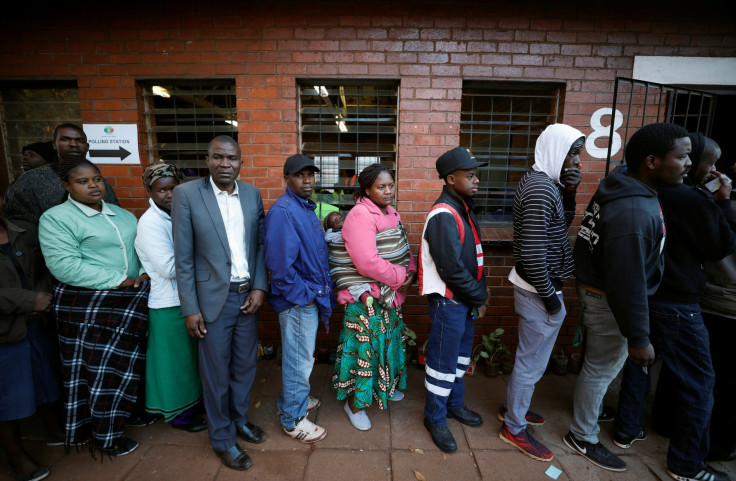Zimbabweans Begin Voting In First Election Since Mugabe's Removal

Zimbabweans began voting on Monday in the first election since the removal of former president Robert Mugabe, a watershed vote they hope will rid the country of its global pariah status and spark a recovery in its failed economy.
The election will see 75-year-old President Emmerson Mnangagwa, a long-time Mugabe ally, face 40-year-old Nelson Chamisa, a lawyer and pastor who is vying to become Zimbabwe's youngest head of state.
Voting started at 7 a.m. (0500 GMT) and will end at 7 p.m.
Polls give former intelligence chief Mnangagwa, who took over as president after the army ousted Mugabe in a bloodless coup in November, only a slim lead over Chamisa.
There will be a runoff on Sept. 8 if no candidate wins more than half the votes.
Nicknamed "the Crocodile", an animal famed in Zimbabwean lore for its stealth and ruthlessness, Mnangagwa has pledged to revive a moribund economy, attract foreign investment and mend racial and tribal divisions.
Queues of eager voters snaked around the streets of the capital Harare from before sunrise.
"ZANU-PF is the only party that I have voted for," said Elizabeth Kamhunga, 67, after casting her vote at a school in the Malbereign suburb of Harare.
"We may have made some mistakes but I think President Mnangagwa is the only person who has the interests of Zimbabwe at heart.”
Chamisa, a charismatic speaker who honed his craft in the courtroom and the pulpit, has won over young and unemployed voters who are frustrated with nearly four decades of Zimbabwe African National Union-Patriotic Front (ZANU–PF) rule.
"This is a historic day," said Fabian Matsika, a security guard who woke at 4:30 a.m. to travel to his polling station on the outskirts of the capital.
"I'll vote for Chamisa because it is a vote for change, it is a vote for the youth. Tomorrow we will have a new president."
In a surprise intervention on Sunday, Mugabe said he would vote for the opposition, turning on his one-time allies.
Mnangagwa later accused his former boss of striking a deal with Chamisa, but provided no evidence.
For Zimbabwe to be welcomed back into the international fold, end painful sanctions and secure the donor funding program it needs to stem chronic cash shortages, observers have to sign off on the vote as being credible at least.
There have been reports of intimidation and coercion in the build-up to the vote and state media is biased toward the ZANU–PF, but there is a consensus that the process has been better than before.
Mnangagwa has welcomed in foreign media and international observers from the European Union, the United States and the Commonwealth, who are watching polling stations across the southern African country.
Whoever wins will face the mammoth task of putting Zimbabwe back on track after 37 years of Mugabe rule that was tainted by corruption, mismanagement and diplomatic isolation, sending one of Africa's most promising economies into crisis.
© Copyright Thomson Reuters 2024. All rights reserved.











